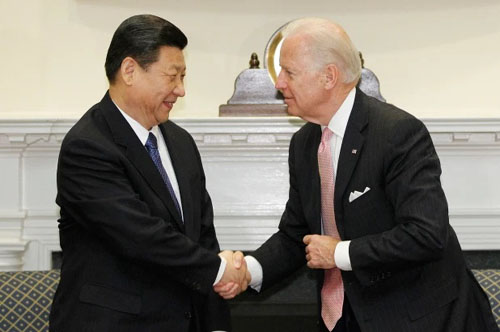FPI / August 19, 2020
Commentary by Paul Crespo
(Part 2 in a series on Joe Biden’s family history which includes drugs, crime and corruption.)
As shown in Part I on the Biden family, Joe Biden’s son, Hunter is an absolute train wreck of a man, with a lifelong history of alcohol and drug abuse, a bizarre and reckless personal life, wrapped up in financial irresponsibility. How then, does this mediocrity get lucrative positions making millions of dollars advising foreign firms in Ukraine and China, with no relevant industry of country experience?
The answer of course is his father, Vice President Joe Biden. Oh, and his father’s buddy, Secretary of State John Kerry, too.

In June 2009, after a string of unimpressive jobs, and five months after his father became vice president, Hunter Biden, the 39-year-old son of Joe Biden, joined Christopher Heinz, the stepson of the chairman of the Senate Committee on Foreign Relations (later to be secretary of state) John Kerry, in a new financial venture. At the center of this business network composed of a related series of LLCs, was Rosemont Capital, the alternative investment fund of the Heinz Family Office.
Related: Biden, Part I: Daddy’s boy — the Hunter train wreck, August 18, 2020
As the New York Post explains, what they were really creating was an international private equity firm “populated by political loyalists and positioned to strike profitable deals overseas with foreign governments and officials with whom the U.S. government was negotiating.” And who were the two leading figures conducting these negotiations? – Vice President Biden, and soon to be Secretary of State Kerry.
Hoover Institute scholar Peter Schweizer, author of the book “Secret Empires”, writes that of their various LLCs, Rosemont Seneca Partners was the most troubling. Based out of its Georgetown offices in Washington, D.C., Hunter Biden was “less than a mile from John and Teresa Kerry’s 23-room Georgetown mansion, and just two miles from both Joe Biden’s office in the White House and his residence at the Naval Observatory.”
Over the next seven years of the Obama administration, Rosemont companies secured a series of exclusive financial deals often with the same foreign governments that Joe Biden and John Kerry were negotiating sensitive and high stakes deals with.
While Hunter Biden’s Ukraine connection got most of the publicity recently, his commercial dealings with Chinese government-backed enterprises was far more significant and concerning.
Schweizer notes that less than a year after launching Rosemont Seneca, Hunter Biden and third partner Devon Archer were having meetings in China at the highest levels.
In China they were joined by the politically connected Thornton Group from Boston, headed by the nephew of mafia hitman James “Whitey” Bulger, writes Schweizer in the New York Post.
The Thornton Group’s account of the meeting on their Chinese-language website (but not on their English language site) was telling: Chinese executives “extended their warm welcome” to the “Thornton Group, with its U.S. partner Rosemont Seneca chairman Hunter Biden (second son of the now Vice President Joe Biden).”
These unique meetings for a small new U.S. firm suspiciously occurred according to reports just hours before Hunter Biden’s father, the vice president, met with Chinese President Hu Jintao in Washington as part of the Nuclear Security Summit. Other meetings coincided with State trips by Joe Biden to China where Hunter tagged along as part of the official delegation, such as the one in December 2013 with newly minted supreme leader Xi Jinping.
That trip coincided with a major unreported deal that Rosemont Seneca was striking with the state-owned Bank of China which they signed approximately 10 days later. As The New York Post explains, “the most powerful financial institution in China, the government’s Bank of China, was setting up a joint venture with Rosemont Seneca.”
Schweizer notes that “Rosemont Seneca and the Bank of China created a $1 billion investment fund called Bohai Harvest RST (BHR), a name that reflected who was involved. Bohai (or Bo Hai), the innermost gulf of the Yellow Sea, was a reference to the Chinese stake in the company. The “RS” referred to Rosemont Seneca. The “T” was Thornton.”
That fund, however, was just the tip of the iceberg. Many of the investment deals that were made by this Hunter Biden joint fund with the Chinese would also have serious national security implications for the United States.
As Schweizer describes:
In 2015, BHR joined forces with the automotive subsidiary of the Chinese state-owned military aviation contractor Aviation Industry Corporation of China (AVIC) to buy American “dual-use” parts manufacturer Henniges.
AVIC is a major military contractor in China. It operates “under the direct control of the State Council” and produces a wide array of fighter and bomber aircraft, transports, and drones — primarily designed to compete with the United States.
The company also has a long history of stealing Western technology and applying it to military systems. The year before BHR joined with AVIC, the Wall Street Journal reported that the aviation company had stolen technologies related to the U.S. F-35 stealth fighter and incorporated them in their own stealth fighter, the J-31. AVIC has also been accused of stealing U.S. drone systems and using them to produce their own.
In September 2015, when AVIC bought 51 percent of American precision-parts manufacturer Henniges, the other 49 percent was purchased by the Biden-and-Kerry-linked BHR.
In short, notes Schweizer, the Chinese government was “literally funding a business that it co-owned along with the sons of two of America’s most powerful decision makers.” That business then facilitated China’s acquisition of critical dual-use military technology and endangered American national interests.
If one overlooks a blatant breach of U.S. national security by the No. 2 leader in a nation known for “rule of law,” this is impressive. Not bad work for a lifelong alcoholic and cocaine abuser.
And that’s thanks to his dad, Joe Biden. (Next, Part 3.)
FPI, Free Press International
